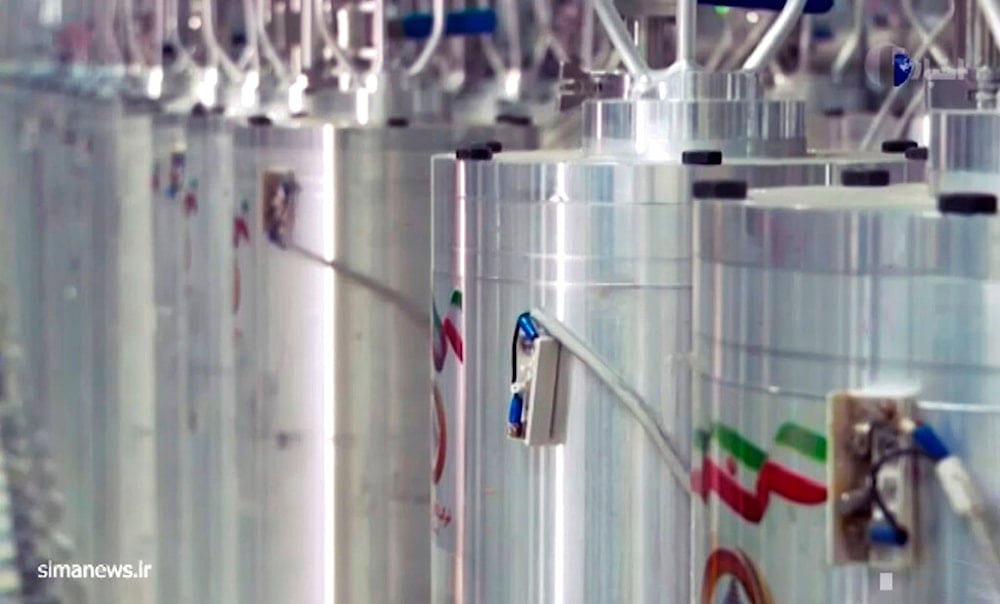Iran demands Trump guarantee in return for nuclear concessions
Iran has upheld a firm stance, rejecting any dismantling of its centrifuges, a complete halt to uranium enrichment, a return to the 2015 stockpile limits, or negotiations over its missile program.
-

In this image made from April 17, 2021, video released by the Islamic Republic Iran Broadcasting, IRIB, state-run TV, various centrifuge machines line the hall damaged on Sunday, April 11, 2021, at the Natanz Uranium Enrichment Facility, some 200 miles (322 km) south of the capital Tehran, Iran (AP)
Iran has expressed openness to curbing aspects of its uranium enrichment program, but only if the United States offers binding guarantees that US President Donald Trump will not again abandon a future nuclear accord. A senior Iranian official conveyed this position to Reuters on Friday, just ahead of a second round of indirect US-Iran negotiations set for Saturday in Rome.
The talks follow last week's discussions in Oman, which both sides described as constructive. They mark the highest level of engagement since Trump's 2018 withdrawal from the 2015 Joint Comprehensive Plan of Action (JCPOA). Trump's reinstatement of sanctions under a "maximum pressure" campaign and recent threats of military action have reinforced Iran's wariness about reentering any deal without safeguards.
Iran, on its part, has upheld a firm stance, rejecting any dismantling of its centrifuges, a complete halt to uranium enrichment, a return to the 2015 stockpile limits, or negotiations over its missile program.
"Iran understood in indirect talks in Oman that Washington doesn't want Iran to stop all nuclear activities, and this can be a common ground for Iran and the US to start a fair negotiation," the official told Reuters.
Diplomatic Crossroads
Tehran maintains that an agreement remains possible if Washington refrains from "unrealistic demands" and commits to serious diplomacy. US Special Envoy Steve Witkoff, however, stated earlier this week that Iran must "stop and eliminate its nuclear enrichment" in order to reach a deal.
Iran has signaled its readiness to cooperate with the International Atomic Energy Agency (IAEA), which it considers "the only acceptable body in this process." In return, it demands the lifting of US sanctions on its oil and financial sectors.
Amid these dynamics, IAEA Director General Rafael Grossi, currently in Tehran, issued a warning Thursday against threats of military action. "The IAEA has always emphasized that threats against Iran's nuclear facilities are unacceptable and that the attacks that are being discussed could not only worsen existing problems, but also create more serious environmental consequences," he said, as quoted by Iranian media.
Grossi's comments came after The New York Times reported that President Trump had blocked an Israeli proposal to strike Iran's nuclear infrastructure. Trump instead opted to resume diplomacy with Tehran, despite having reimposed punitive measures earlier in his term.
In parallel to the upcoming US-Iran talks, Israeli Strategic Affairs Minister Ron Dermer and Mossad chief David Barnea reportedly traveled to Paris to meet with Witkoff. Israeli sources said the meeting was aimed at coordinating positions ahead of Saturday's negotiations. Meanwhile, Prime Minister Benjamin Netanyahu reiterated Israel's hardline stance: "Israel will not allow Iran to acquire nuclear weapons."
Read more: Israeli minister, Mossad chief to meet Witkoff ahead of US-Iran talks
Grossi, who also met with Iranian nuclear officials and Foreign Minister Abbas Araghchi, said the IAEA is eager to act as a bridge between the parties. "We are in a very crucial stage of these important negotiations. We know we don't have much time, this is why I am here ... to facilitate this process," he said.
As the next round of negotiations approaches, the gap between Iran and the US remains wide. Yet the involvement of the IAEA and the continued diplomatic engagement suggest that both sides still see a window—albeit a narrow one—for resolution.

 4 Min Read
4 Min Read










